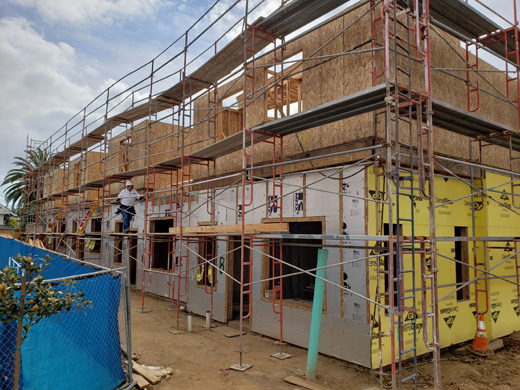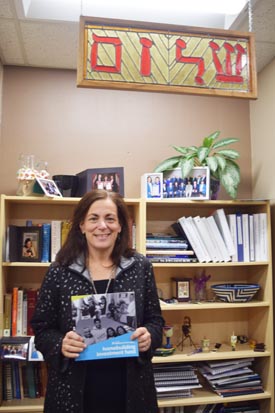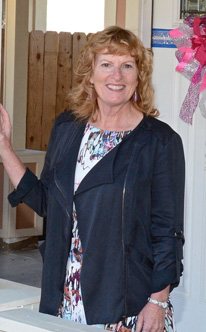
By Donald H. Harrison


SAN DIEGO – You set up a donor advised fund at the Jewish Community Foundation, find a worthy charitable project, recommend to the foundation that it grant money from your fund to that project, and then, poof, is the donated money then gone, its one-time purpose achieved?
It doesn’t have to be.
Especially with small donors in mind, the Jewish Community Foundation recently entered into two agreements that will permit donors to recycle their charitable dollars by having them invested by the foundation, rather than donated, in projects with favorable social impact.
One already approved project will help Habitat for Humanity build a total of 30 homes in the county. Another will assist low-income women entrepreneurs to build their businesses.
“Our donors are learning about ‘impact investing,’ the idea that they can use their philanthropic dollars, invest it for good, get the money back, and do more good,” Beth Sirull, the Jewish Community Foundation’s president and chief executive officer, commented during a recent interview at her offices in the Kearny Mesa area.
Sirull, a member of Congregation Beth El, noted that daily minyans recite (or sing) a daily prayer containing the Hebrew words Ufros Aleinu Sukkat Shlomecha, thanking God for spreading over us “’a shelter of peace,’ which I take to mean that everyone needs a roof over his head.
“You can’t have a shelter of peace if you are living in a tent,” Sirull added. “To me, it was an exceedingly Jewish thing to do, to invest in this fund.”
To build the 30 houses, Habitat for Humanity needed to finance $3 million of a total $12 million fund. It put up $1 million from its own capital. To raise another $2 million, it asked Mission Driven Finance, a private investment company, to create a vehicle that would be attractive to investors willing to receive 2 percent interest on projects with high social impact.
Sirull was introduced to the project by David Lynn, the chief executive officer of Mission Driven Finance. In turn, the Jewish Community Foundation “had our own internal compliance and due diligence work to do,” she noted. “We had to work with our investment committee to get this approved. This is new for the Jewish Community Foundation; typically our donors invest in stocks, bonds, and some private equity, but not directly into affordable housing, so we had internal education for our staff, our board, and our investment committee.”
After these requisite approvals, “I went out to donors who had voiced a concern to me about what a pressing issue affordable housing is in San Diego,” Sirull said.
The Jewish Community Foundation administers nearly $500 million in charitable funds, some of which are endowments for institutions in both the Jewish and larger general communities, and some of which are donor-advised funds. In addition to various Jewish organizations and synagogues, the Jewish Community Foundation manages money for the San Diego Symphony’s endowment, Planned Parenthood, and the La Jolla Playhouse, among other organizations.
Of the $2 million that Habitat for Humanity requested from outside investors, the Jewish Community Foundation’s donors covered $300,000 of that amount — 15 percent. Rather than ask a large donor to simply cover that entire amount, she added, it was decided to offer the opportunity to smaller donors, with a $5,000 minimum commitment over the 5-year course of the loan, and a recommended maximum $25,000 commitment, although two donors exceeded that amount. Sirull said dividing the investment package that way would “democratize” the process and introduce more donors to social impact investing.
On a date to be determined in July, the Jewish Community Foundation plans a “builder day” when the organization’s staff, volunteers, and donors will put on their hard hats and help in the construction of a home.
The 2 percent interest that donor’s funds earn each year are added to the corpus in the donor’s fund. The interest is not compounded, Sirull said. At the end of the loan period—or even earlier if Habitat for Humanity completes the project ahead of schedule—the principal is returned, and donors are free to use that money again. They may decide to make another low interest loan, or perhaps to grant that money outright. Whatever they do, they will have increased the effectiveness of their philanthropic dollars.

So, how does this help Habitat for Humanity meet its goal of building homes that low-income people can afford?
Lori Holt Pfeiler, a former mayor of Escondido who today serves as president and CEO of Habitat for Humanity in San Diego County, responded that without the upfront money provided by the loans, construction of the homes would be delayed pending qualification for various municipal and foundation grants. Once early money becomes available, Habitat for Humanity can build the homes, then sell them to low-income families. Afterwards, it can sell the mortgage to a bank, at a discount, and with the proceeds of that sale, pay off the lenders (such as the Jewish Community Foundation funders), and put the residue toward building another home.
Banks have an incentive to purchase low-income mortgages because they will earn credits under the federal Community Reinvestment Act. These credits are helpful when applying for government permission to expand their businesses through acquisitions or mergers.
Pfeiler said that under the current building program Habitat for Humanity will construct 11 houses in the Logan Heights neighborhood of San Diego, 6 in National City, 7 in El Cajon, 2 in Encinitas, and 4 more at locations to be decided.
The median income for a family of four in San Diego County is $75,000 per year. Any family that earns between 30 percent and 80 percent of that figure per year ($22,500 and $60,000) is eligible as a low-income family to purchase a home from Habitat for Humanity, according to Pfeiler.
Family members pay for the home with both their time and their money. Recipients are required to work 500 hours, including time building their own houses. Additionally, they pay a base mortgage computed on 30 percent of their gross income, plus taxes, insurance and, if applicable, homeowner organization assessment (HOA) fees.
To illustrate, let’s say a low-income family earns $38,000 a year, which is 45 percent of the annual median income in this area, well within the 30-80 percent range. To purchase their home, they would have to pay to Habitat for Humanity 30 percent of their annual income. This would compute to a base mortgage of $11,400 a year for 30 years, for a total of $342,000, to purchase the house. That base payment is equivalent to $950 per month, and to that would be added taxes, insurance and any HOA fees.
Pfeiler said that the base mortgage would remain constant throughout the 30-year period. If the homeowners’ financial situations improve, and they decide to sell their homes, they would be required to do so at an affordable price. “They purchased the home at the ‘affordable price’ and they must sell the home at the ‘affordable price’ to another low-income family,” she said. “They must offer the home to Habitat first. This makes the most sense as we have a waiting list and we know how to buy and sell the property.”
David Lynn, the Mission Driven Finance CEO, said the Jewish Community Foundation is but one of the contributors to Habitat for Humanity’s “Homebuilding Investment Fund.” The San Diego Foundation is another contributor, he said. He said that his company charges a relatively small fee above expenses to create the financing vehicle, and that he, personally, contributed money from his own funds to the Habitat for Humanity program.
Lynn, who previously served as chairman of San Diego Grantmakers, also serves on the steering committee of the San Diego Impact Investors Committee. That group’s executive director, Robert Foster, suggested the creation of a Women’s Empowerment Fund in San Diego County, and Lynn also told Beth Sirull about that social-impact project. Smaller in scope, the Women’s Empowerment Fund sought to raise $1 million from outside forces, to which donors to the Jewish Community Foundation subscribed “a bit more than $200,000,” Sirull said.
“Generally women who have an artisan jewelry business or an artisan food business, where they own a food truck, or a cleaning service need a little capital,” Sirull said. “The Women’s Empowerment Fund will loan between $5,000 and $25,000 (per entrepreneurial enterprise), and we are inviting our donors to make a similar investment, also at 2 percent. This is arguably a little risker than Habitat for Humanity, but arguably it can impact more people.”
Sirull explained that “when the matriarch of the family is making a living, we know statistically the reverberation that has on the family and the community. In the developing world, generally when the woman in a family owns a business, the likelihood of her children going to school goes way up. And family size tends to decline so instead of six children, they have two children, and health issues tend to decline.
“There are lots of positive outcomes from economic opportunity for low-income women,” Sirull added.
While the interest rate of 2 percent is the same, the Women’s Empowerment Fund projects a two-year time before the loan is repaid to the investor, compared to five years for the Habitat for Humanity program. Investors have the option of reinvesting the principal.
“We encourage lots of women to participate, and I anticipate down the road, after a bunch of loans have been made, that we will have a business fair where the borrowers will talk about their businesses. We have invited women who are participants in our Jewish Women’s Foundation, so I anticipate that most of the investors will be women, although a couple will not be.”
To further help the fledgling entrepreneurs, Sirull said, “we could create a little holiday catalog and encourage people to buy those products.
“We see this as an opportunity to do good in the world very effectively. It is also a way to engage donors in social change, in a very hands-on manner.”
*
Harrison is editor of San Diego Jewish World. He may be contacted via donald.harrison@sdjewishworld.com